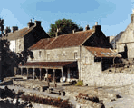|
|
|
|
|
Travel To Ceres, One Of The Most Attractive Villages In Scotland
Once described as 'the most attractive village in both Fife and Scotland.' Ceres was mentioned as early as the 12th century, it was created a burgh of barony in 1620 under the Hopes of Craighall, developing as a centre of farming, weaving, and brewing. Unlike most Scottish villages its attractive pantiled cottages stand round a green which is the scene of annual games which are the oldest in Scotland. These games celebrate the return of the men of Ceres from the Battle of Bannockburn in 1314.
There is a Bannockburn Memorial by the village green and an old bridge over the Ceres Burn leads to the Fife Folk Museum which was opened in 1968 by the Central and North Fife Preservation Society. Built into a wall in the main street is the seated figure of the Rev. Thomas Buchanan, the last Church Provost in 1578.
The Parish of Ceres, of which Ceres is the principal village, lies to the South and East of the Parish of Cupar, in North Fife. Its total length from North--east to South--west is 6 miles. Its breadth varies from half a mile to three and three-quarter miles. The ground rises to 622 ft. at Waltonhill, the highest point in the Parish, but in other parts is at sea--level. Craigrothie Burn, Glassiehow Burn and Craighall Burn, along with 2 other small rivulets unite to form Ceres Burn which becomes a tributary of the River Eden, a section of which marks the boundary between Ceres and Cupar.
Ceres is first mentioned in the reign of William the Lion (1165-1214) when the lands belonged to the family of "Syras". A daughter of this house married Sir Michael Scott, the famous warlock and thus the lands of Ceres became part of the barony of Strathmiglo which belonged to the lineal descendant of Sir Michael till 159g. They then belonged to the family of Kinninmond till the time of Charles I when they were acquired by Sir Thomas Hope, King's Advocate, whose descendants still own some property in the parish.
There is much argument as to the origin of the name "Ceres". Was it a survival of the Roman invasion because of being identical with the name of the "Goddess of Harvest"? However, the spelling was not always the same. Before the 17th century it was "Seres", whilst the oldest known form is "Syres". St. Cyrus, to whom the Church was dedicated, is also given credit for the name. Another suggestion is the Latin word syrus, which means marshy ground near a running stream. There is also the possibility that the "Syras" family are responsible. Who can tell?
The population of Ceres Parish, which includes the villages of Baldinnie, Ceres, Chance Inn, Craigrothie and Pitscottie, has fallen very considerably over the last hundred years, chiefly owing to the decrease of the linen and other industries. In 1755, there were 2,540 inhabitants in the Parish. By 1841 the number had risen to 2,944. The census of 1931 showed a population of only 1,425 and that of slight increases to the present day.
Westwood's Directory for the counties of Fife & Kinross published 1862.
"Ceres parish, containing the villages of Ceres, Pitscottie, Craigrothie, Chance Inn and Baldinnie, is bounded by St Andrews, Cameron, Kemback, Largo, Scoonie, Kettle and Cults. It measures about 7 miles by 4 miles. Fully one half of the land is highly cultivated. There is plenty of limestone, which is extensively worked, and coal is found at Ladeddie. The village of Ceres is 2.5 miles south of Cupar on the road to Largo. The hand-loom weaving of linen has long been carried on here and in Craigrothie, but is now in decline. One bleachfield remains, and there are spinning mills at Tarvit Mill and Pitscottie.In the rural areas, the inhabitants are employed in agriculture, and in mining limestone and coal. Ceres village has a parish church, a Free Church and 2 United Presbyterian Churches (East & West). The latter was the earliest seceeding congregation in the centre of Fife, a number of its members living 10 to 15 miles distant."
If you would like to visit this area as part of a highly personalized small group tour of my native Scotland please:
e-mail me today
Or why not visit my extensive
Travel Scotland
Web site at:
Travel Scotland
Home Page
|
|
|
|
|

